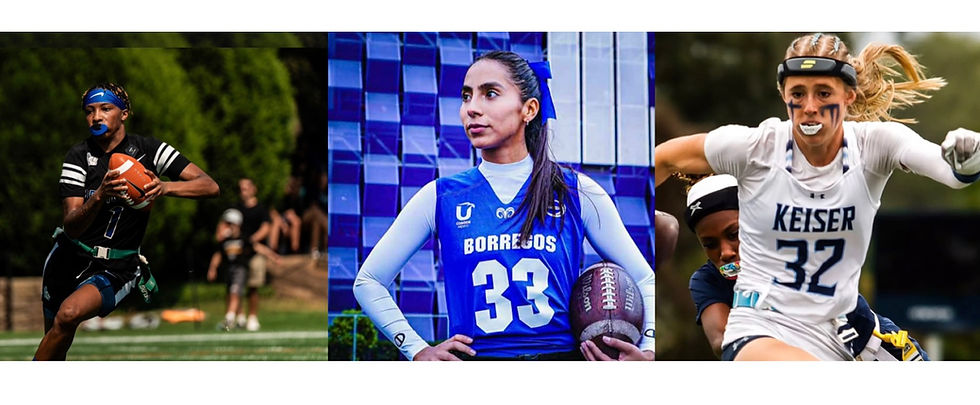Can Forfeiting Games Result in Athletes Forfeiting Funds?
- Kate Rosenberg

- Sep 7, 2021
- 3 min read
Updated: Aug 11, 2022
This week marked the beginning of the Name, Image, and Likeness (“NIL”) era of collegiate football. As the 2021 season began, the Power Five conferences released their new policies regarding COVID-19. Arguably the most intriguing of these are the forfeiture policies, which generally reflect the same ideas throughout the conferences. The SEC was the latest to reveal its forfeiture policy, requiring any team that must cancel a game due to COVID-related reasons to receive a loss for that game. Should the opposing team not also have a COVID-related cancellation, they would receive an automatic win. These policies are not surprising given the increased push in the sports world to get players vaccinated, however, they may have an interesting impact on athletes’ NIL deals.
For the last two months, many athletes have taken advantage of their newfound freedom to profit from their name, image, and likeness by signing with sponsors. Many of these deals market off the athletes’ social media with sponsored posts about different products or brands. Other deals utilize the screen time athletes get during games to promote their products. These kinds of deals almost seem too easy for the players to capitalize on – players continue to perform as they had before, but now, colleges and universities are not the sole beneficiaries from their talents. However, with the threat of COVID and forced forfeitures, cancelling games equals profit loss. The fewer games the athletes participate in, the less screen time they receive. Moreover, NIL deals may also be heavily reliant on the number of games the teams win. Brands want to sponsor the best players, so if players aren’t winning, they aren’t earning. The more games they play, the more opportunities to win, and the more players will likely earn.
The Pac-12’s new idea of allowing athletes to use their game footage to secure sponsorships reinforces how the loss of screen time can affect NIL deals: the lack of game footage could negatively impact athletes' potential NIL profits. Footage from this upcoming season would be available to the athletes to use, but if they are forced to forfeit a game, they lose potential game footage that could have helped them secure deals. USA Today revealed that “under the league’s licensing arrangement, the Pac-12 Network owns licensing rights to any game footage hosted by the conference, so it can give players almost immediate access to their game footage that will be aired this season. The Pac-12’s licensing partner, Veritone, plans to help with this new project as there are numerous ways this footage could be used by sponsors. Veritone’s Mike Arthur, explained a few: “A sponsor could enter into an agreement with an individual athlete and subsequently license footage from the network, or a sponsor could come to the network directly, in which case a student-athlete clearance fee would be passed back to the sponsoring brand.” This footage would not allow athletes to earn compensation from personal use on social media, however. The Pac-12 is the first of the Power Five conferences to pursue this avenue for athlete compensation, but the others are likely not far behind.
The risk of missing games can hinder college athlete NIL deals, but these new forfeiture policies may be pushing athletes to another solution – getting vaccinated. Most schools have yet to mandate COVID-19 vaccines for students but have attempted to implement different policies to encourage vaccinations. The forfeiture policies are likely another attempt to facilitate a smoother, fairer football season amidst the pandemic. However, it is undeniable that more athletes being vaccinated would lower the risk of game cancellations. The risk of game cancellations resulting in forfeiture may be enough to convince athletes to get vaccinated, and further, not risk any potential payout. With the newfound potential to earn, athletes should focus on being able to play as many of their games as they can. As the North Carolina Tar Heels head coach Mack Brown stated, “Make it about your ball, not your brand. Without your ball, you're not going to make any money.”
Kate can be found on Twitter @Katerosey1. She is a student at Texas A&M School of Law and is the creator of Sports Law Girl.







EPS Machine EPS Cutting…
EPS Machine Eps Raw…
EPS Machine EPS Recycling…
EPS Machine EPS Mould;
EPS Machine EPS Block…
EPP Machine EPP Shape…
EPTU Machine ETPU Moulding…
EPS Machine Aging Silo…
EPTU Machine ETPU Moulding…
EPS Machine EPS and…
EPS Machine EPS and…
AEON MINING AEON MINING
AEON MINING AEON MINING
KSD Miner KSD Miner
KSD Miner KSD Miner
BCH Miner BCH Miner
BCH Miner BCH Miner
EPS Machine EPS Cutting…
EPS Machine Eps Raw…
EPS Machine EPS Recycling…
EPS Machine EPS Mould;
EPS Machine EPS Block…
EPP Machine EPP Shape…
EPTU Machine ETPU Moulding…
EPS Machine Aging Silo…
EPTU Machine ETPU Moulding…
EPS Machine EPS and…
EPS Machine EPS and…
AEON MINING AEON MINING
AEON MINING AEON MINING
KSD Miner KSD Miner
KSD Miner KSD Miner
BCH Miner BCH Miner
BCH Miner BCH Miner
These games are quite popular nowadays, so I know what you mean. One resource I've come across is colour gaming website which offers a variety of online games and other valuable information. It's a fantastic place to discover new games and expand your gaming horizons. Thanks in advance for your suggestions and happy gaming.